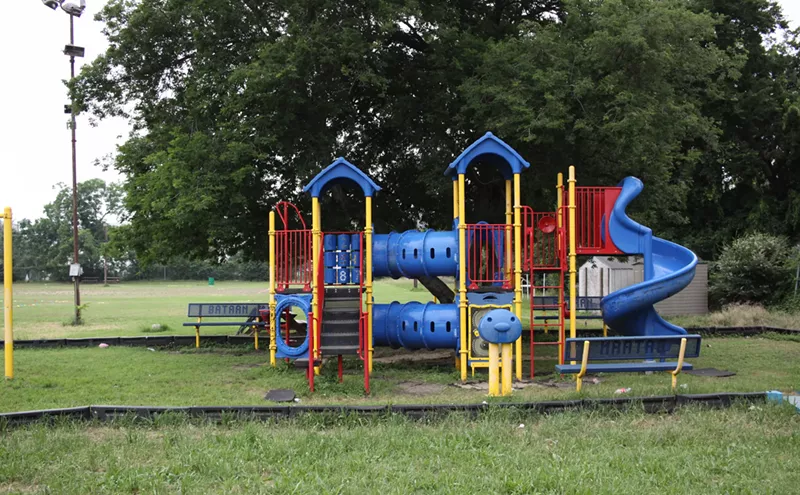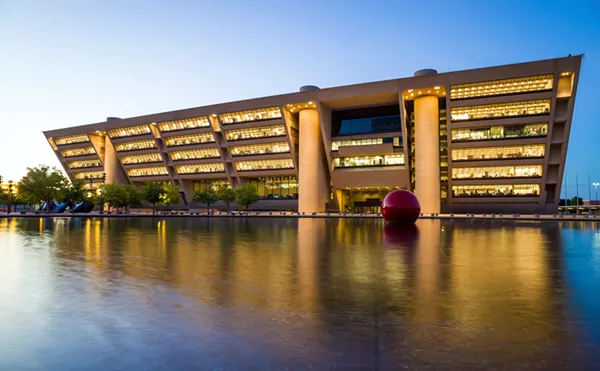Ah, you hate to see it. Ben Sandifer, the bicycling nature photographer, has always exuded a certain purity of heart. But on the way back from a city-sponsored tour of a recently decimated portion of the Great Trinity Forest, a colleague and I speculated about him. We both thought he was beginning to get that dark look in the eye.
Is that a good thing, we wondered, because now he's one of us? Or is it a bad thing, because we are, after all, zombies?
Sandifer, an accountant by profession, is in love with the forest. His award-winning photos of the forest are the only windows many people have into this great natural wonder at our doorstep.
Inevitably, irresistibly, somewhat horribly, Sandifer and the rest of the freelance forest rangers — the Barker brothers, Hal and Ted, biologist Becky Rader, longtime landowners Bill and Zada Pemberton, naturalists Tim Dalbey, Jim Flood, Richard Grayson, Sean Fitzgerald, Eric Reed and others — have been slowly sucked into the merciless political threshing machine of City Hall back-corridor politics. Not a pretty thing to watch.
From the beginning when backers of the so-called Trinity River Plan began pitching it to voters 17 years ago, one of the selling points was the Great Trinity Forest, a broad band of densely wooded territory along the Trinity River in southern Dallas. Touted as a major amenity, the Great Trinity Forest was sold as another of those world's-biggest-ball-of-string attractions the old Dallas was so drawn to — roadside wonders that were always going to put this burg on the map. Nobody else in A-murca would have an urban forest as big as Dallas' urban forest.
As we have seen since, however, the city's old leadership, acting through minions at City Hall, tends to work with a view of the word "forest" as meaning "undeveloped land." And whaddya do with undeveloped land? Well, by-jeez, you git on out there and develop that sucker. At least cut them trees down and get a good golf course on it.
Sandifer was one of several forest lovers who discovered that the city had allowed a contractor to drain and decimate a beautiful natural pond for reasons that remain obscure. City officials said the pond looked like cheap water the contractor could use for dust control in building a golf course nearby.
Nature I.Q. Test Question No. 1: Who even looks at a pond in the forest and thinks, "Hey, cheap dust-control water!"
At about the same time, Sandifer, the Barkers and others discovered a new road chopped through the forest leading to a 20-acre, 20-foot-deep strip-mining operation where a contractor had bulldozed the forest and trucked out ton after ton of rich soil for the golf course. The hole left behind is the size of the "lakes" the city now plans to create along the river closer to downtown.
Nature I.Q. Test Question No. 2: Who looks at a forest and thinks, "Hey, cheap dirt!"
After the city got caught, they tried to blame both mutilations of the forest on contractors, as if the city were not responsible for its own contractors, and Assistant City Manager Jill Jordan sent out an email vowing that such things would never happen again: "We are very sorry that this has happened," she said, "not only for the sake of the environment and wildlife affected but also because this type of incident does not promote trust between the City and the friends of Big Spring and the forest. We are taking steps to work with our employees to help them understand the value of the forest."
So, I guess that would mean the contractors have to dig the soil back up and truck it back out into the forest and restore what they destroyed. Right? All of this was to be resolved with some changes to the underlying city contracts and resolutions authorizing the horse park and golf course projects.
Sandifer assumed the normal process of notification, briefings and meetings would take place so that he and his fellow activists would have a chance to influence the outcome. Then he found out his group had been bureaucratically sucker-punched.
In an email to Jordan (the person of the many churchy-sounding promises only days before), Sandifer said: "Imagine me, standing in line at Central Market with a shopping cart full of beer on a Friday night and being told from a real estate developer for Hillwood 'Ohh, you got snowballed on that one, they slipped it into the September 18, 2014, zoning commission meeting. Joke's on you, man.'"
In fact a series of resolutions had been jammed into a city plan commission agenda for a few days later granting the city and its contractors retroactive permission, forgiveness and the go-ahead for everything bad they had already done.
"I am getting the distinct impression that I am not worth the truth," Sandifer wrote to Jordan. "That bothers me on a personal level. I was promised this would not happen. I tend to believe what people tell me and when someone looks me in the eye and shakes my hand with a promise, their word becomes their bond."
And that was really only the first of a two-sucker-punch-combo. A few days later, Sandifer picked up the paper and read that the pond had never really been hurt all that much and that it was already in a fully restored and possibly even "better" condition.
Nature I.Q. Test Question Number Three: How do you make nature "better?"
Easy, according to City Council member Vonciel Hill. Apparently you just sort of snap your fingers. In an angry memo denouncing fellow council member Scott Griggs for accusing city staff of negligence, Hill said, "Once management realized the error, the error was immediately acknowledged, an apology was issued, the matter self-reported to the appropriate regulatory agencies ... the pond was immediately restored to its original (or better) condition ..."
Last Friday, only two days after reading Hill's assurances that the pond was now better than natural, Sandifer and a dozen naturalists joined city staff for a tour of the pond. All of them, city staff and naturalists alike, agreed the pond was still, in the words of one top city staffer, "screwed."
Toward the end of the tour, Sandifer said to the assembled city staffers, "I read that Judge Hill sent out a memo to Scott Griggs a couple days ago, and it had a bunch of bullet points about how the pond was restored to 'original or better condition.'
"While the water is up," he said, "as you can see the pond is not restored. This whole ecosystem here is damaged."
City staffers nodded in agreement, and one said, "Correct."
"Has she been down here?" Sandifer asked. "Have you all taken her down here on a field trip?"
Staffers consulted busily with each other, asking him if he was still talking about Hill, and then one said softly, "No."
"My concern," Sandifer said, "is that I want the message of what's actually going on down here to be 100 percent truthful and factual. It's very important that that happens.
"Emails I have sent and a lot of the things I have shown to other people are the truth — the best I can think is the truth. I would swear on a stack of Bibles that it's the truth. I don't want my message or my name to be muddied in this by politicians taking cheap shots."
Beyond the level of personal insult, the larger issue that champions of the forest face is a culture that really just does not know what a forest is — the same culture, probably, that wanted to convert a rare prairie at White Rock Lake into a parking lot and permanently scar the other end of the lake with a commercial restaurant development. It's the same culture that thinks bulldozing a logging road through the forest and sucking all the water out of a natural pond is an improvement
They will never get it. Nature looks to them like a shopping mall that hasn't been built yet. If there's some kind of a something out there you're supposed to go see, some bird or a snake or something, then you need a paved road so you can drive on out there and see the damned thing. Better be big.
That's one thing. Call it a cultural problem. The activists fighting to save the Trinity Forest and the people at City Hall fighting to turn it into a golf course see the world differently. Can't help that sometimes. Takes all types.
But that doesn't really explain slicking Sandifer by promising him to his face he would have plenty of notice on the contract revisions, then fast-tracking them to a City Hall agenda a few days later. It doesn't explain Hill very publicly calling Griggs a liar and Sandifer a liar by extension, when in fact the lie was told by Hill.
Toward the end of last week's pond tour, I asked Sandifer, "How much faith do you have in this process here today?"
"None," he said. "I'd better not have my back turned."
That's the dark eye my colleague and I were talking about on the way back to the office. He didn't always have it. But people who deal with Dallas City Hall long enough get it eventually. I need to call him up and tell him it's not all bad being one of us. Now that he has come over to our side, we can get those city staffers out there in the woods on another tour and maybe eat one of them.












